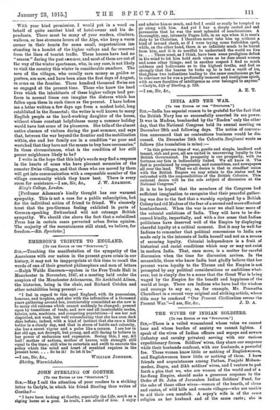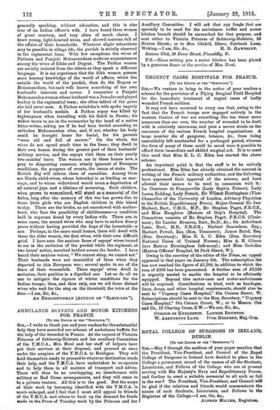THE WIVES OF INDIAN SOLDIERS.
[To rat Eorroa or TM ‘. Sr.-mm.]
SIR,—There is a veiled womanhood whose voice we cannot hear and whose burden of anxiety we cannot lighten. I speak of the wives of Indian officers and sepoye and sowers (infantry and cavalry privates) serving with our various expeditionary forces. Soldiers' wives, they share our suspense while their husbands confront, with our husbands, a powerful foe. These women know little or nothing of Englishwomen, and Englishwomen know little or nothing of them. I have friends and acquaintance, among Pathan, Punjabi Moham- medan, Dom, and Sikh soldiers' wives, and I venture to put forth a plea that we, who are women of the world and of a far-flung Empire, should make a generous response to the Order of St. John of Jerusalem Indian Soldiers' Fund, for the sake of those other wives—women of the hearth, of clans and castes, of wild hills and remote villages—who are unable to aid their own menfolk. A sepoy's wife is of the Fame religion as her husband and of the same caste ; she is
generally speaking, without education, and this is also true of an Indian officer's wife. I have found them women of great courtesy, and very often of much charm. I know young, light-hearted wives, and shrewd matrons full of the affairs of their households. Whatever slight relaxations stay be possible in village life, the purdah is strictly observed in the regimental lines. With few exceptions the wives of Pathans and Punjabi Mohammedans make no acquaintances among the wives of Sikhs and Dogras. The Pathan women are socially isolated from the others as they speak a different language. It is my experience that the Sikh women possess more hearsay knowledge of the world of affairs, which lies outside the world of the purdah, than do the Dogras or Mohammedans, but each wife knows something of her own husband's interests and career. I remember a Punjabi Mohammedan woman whose husband was a Jemadar and played hockey in the regimental team ; she often talked of the game she had never seen. A Pathan anbandar's wife spoke eagerly of her husband's medals. A Pathan sepoy was killed by highwaymen when travelling with his Sahib in Persia; his widow wrote to me in the vernacular by the hand of a native letter-writer, asking me if he had been buried according to orthodox Mohammedan rites, and, if not, whether his body could be brought home for burial, for his parents "were old and full of sorrow." On the whole, the wires do not spend much time in the lines ; they dwell in their own homes during the greater part of their husbands' military service, and the sepoys visit them on their yearly two months' leave. The women are in those homes now, a prey to disquieting rnmoure, utterly ignorant of European conditions, the progress of events, the issues at stake. The British Raj will inform them of casualties. Among them are Hindu child-wives, whose betrothal is as binding as mar- riage, and to whom widowhood would mean a deprivation of all natural joys and a lifetime of mourning. Such children, when grown to womanhood, will stand an a memorial of the fallen, long after the memory of this war has grown dim to those little girls who are English children in this island to-day. There are the brides, as yet unendowed with mother- hood, who face the possibility of childlessness—a condition held in supreme dread by every Indian wife. There are, in some cases, the second wives who may have to endure dreary years without having provided the hope of the household—a son. Perhaps, in the same small homes, there will dwell with them the elder women, the first wives, with their own difficult grief. I have seen the anxious faces of sepoys' wives turned to ma in the seclusion of the purdah while the regiment, at two hours' notice, marched hotfoot across the border. I have beard their anxious voices, " We cannot sleep, we cannot eat." Their husbands were not unmindful of them when they departed to this European war ; several spoke to me of the fears of their womenfolk. These sepoys' wives dwell in seclusion, their position is a dignified one. Let us do all we can to mitigate the rigours of winter conditions for the Indian troops; thus, and thus only, can we aid those distant wives who wait for the step on the threshold, the voice at the door.—I am, Sir, &a,
AN ENGLISHWOMAN (AITTIIOR OF " SAHIB-LOG ").



































 Previous page
Previous page